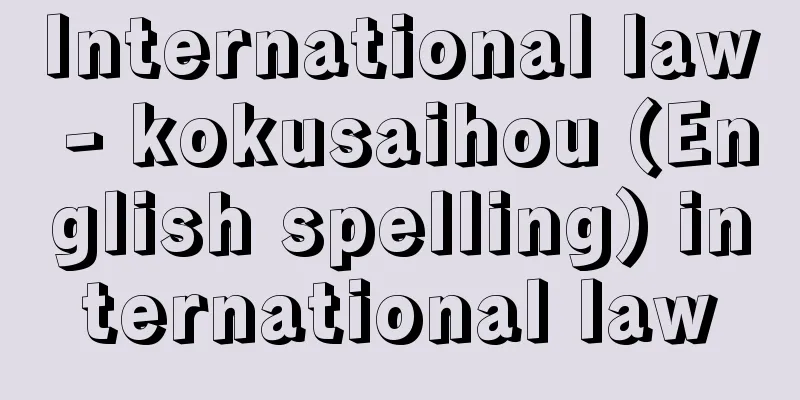International law - kokusaihou (English spelling) international law

|
It is also called international public law. Until the Meiji period, it was also called universal public law. It is the law between nations or the law of the international community. historyIt is said that ancient Mesopotamia, Egypt, Greece, India, and China also had norms similar to international law in part, but they have no historical connection to current international law. In order for international law to be established as a legal system, it was necessary for the establishment of a European state system in which so-called "sovereign states" coexisted, with each country having exclusive sovereignty over its territory and independent of interference from outside powers, such as the Pope and the Holy Roman Emperor. The Congress of Westphalia in 1648 confirmed the establishment of such a state system in treaty, and announced the situation in which international law would be established in European society. The period from the 16th century to the 18th century is called the "Heroic Age of International Jurisprudence," and many outstanding theorists, such as Grotius, contributed to the systematization of international law. However, at that time, international law was "European public law" applicable to the scope of Christian countries in Europe, but from the end of the 18th century to the 19th century, countries in the Americas gained independence and joined international law organizations, and from the mid-19th century onwards, some countries in the Near East, Asia and Africa, such as Turkey, China, Japan and Liberia, also became members of the international community to which international law applies, despite being bound by unequal treaties. Currently, socialist countries and newly emerging countries that have gained independence from colonies have also joined, and international law has become the universal law of the international community. [Yasuo Ishimoto] Differences with domestic lawHowever, it cannot be denied that international law, although it is called law, has structural differences in various respects from domestic law. First, the international community does not have a unified legislative body equivalent to a national parliament. Therefore, the form in which international law exists (the source of law) is different from domestic law, and international law that binds all states exists only in the form of customary international law. In contrast, treaties are binding only on the parties to the agreement. As a result, it is extremely difficult or takes a considerable amount of time to establish law that aims to benefit the entire international community. Second, the international community lacks a judicial institution for the application of law. Although the International Court of Justice is currently established as the main judicial organ of the United Nations, and this court is open to the resolution of disputes between any nations. However, unlike domestic courts, it cannot conduct trials without the consent of the parties involved. The court has no jurisdiction without the consent of the parties, whether that consent is agreed upon in advance in a judicial treaty or judicial clause, or when the case is referred to the court. As a result, even disputes related to international law are not always subject to the court's judgment, and there is a risk that the parties will engage in endless arguments over the existence of facts and the interpretation of the law, or that one side's argument will be forcefully accepted. Third, the international community lacks law enforcement agencies. States have police and armies that can prevent crime, maintain order, and effectively enforce court decisions. In contrast, the international community lacks a unified authority and a system for effectively enforcing international law. Of course, there is a system in place where the United Nations takes preventive and coercive measures against wars of aggression, but there is no guarantee that it will be effective. Moreover, sanctions against wars of aggression cannot necessarily be said to be sanctions against violations of international law in general. [Yasuo Ishimoto] NecessityBecause of this inherent fragility, international law is sometimes criticized as not having the nature of law. Nevertheless, it is an unquestionable empirical fact that social norms known as international law exist in the international community and have been considered as law. International law was established later than domestic law, and has been constructed by reusing the logic and concepts of domestic law, especially private law. In contrast to the basic principles of private law, which recognize the legal subjectivity of all persons, the private ownership of all goods, and the binding nature of agreements, i.e., contracts, the basic principles of international law are the recognition of the legal subjectivity of all states, the sovereignty of states over all nationals and territories, and the binding nature of agreements, i.e., treaties. The systematization of the normative content of international law based on analogy with domestic law can be seen as a factor that has led to the conception of international law as law in the same way as domestic law. In the 19th century, with the Industrial Revolution, commodity trade between national economies and capital exports increased, and transportation and communication methods developed, international interdependence, which dictated the need for international law, continued to grow ever closer. Starting with the most basic treaty, the Treaty of Commerce and Navigation, countless treaties were concluded to regulate consular relations, extradition, postal services, telegraphs, railways, copyrights, industrial property rights, and more, enriching the content of international law. This process of development of international law knows no bounds. In particular, the recent development of science and technology has further expanded and complicated the scope of what is regulated by international law. Thus, many of the relationships in our daily lives today are regulated not only by domestic laws but also by treaties. [Yasuo Ishimoto] International Law and WarInternational interdependence was the basic condition for the establishment of international law, but at the same time, the conflict between nations had to be reflected in the legal status of war in international law. In other words, in international law before World War I, specific rules applicable in war, such as shelling, treatment of wounded soldiers, prisoners of war, and occupation, were established, but the actions of the nations that waged the war itself were left entirely unregulated and not subject to legal restrictions. In other words, war was recognized as a duel in the international community and was considered the last resort to decide which nation's cause to recognize. However, after World War I, general treaties were concluded that denied this status of war and made aggressive wars illegal. The Covenant of the League of Nations, the Kellogg-Briand Pact, and the Charter of the United Nations are typical examples. Today, it can be said that the illegality of aggressive wars is legally confirmed by all nations in the world. This phenomenon of making war illegal is thought to be the axis of the transition from classical international law to modern international law. This led to the peaceful resolution of disputes, the institutionalization of collective security, and the establishment of general peace organizations (particularly the United Nations). [Yasuo Ishimoto] assignmentHowever, the transition to modern international law does not necessarily mean a change in the legal status of war. In the past, international law considered sovereign nations, which were equal to each other, as the subjects of law. These nations were only a small part of the world in terms of both area and population, and most other regions were colonies and were subject to international law. However, after the Second World War, these regions gained political independence one after another through the consciousness and struggle of their inhabitants, and the right of peoples to self-determination was confirmed as an immovable principle in international law. Starting from this point, the establishment of a new international economic order to replace the old order that had been formed by the military and economic power of developed countries has become a realistic schedule, and international law is entering a period of change in content as well. International law not only denies wars of aggression in the future, but also takes on the task of reorganizing and restoring the unequal order that was formed by power in the past. [Yasuo Ishimoto] "New edition of 'International Law I' by Tabata Shigejiro (collected in 'Complete Works of Law,' 55, 1973, Yuhikaku)" ▽ "New edition of 'International Law II' by Yokota Kisaburo (collected in 'Complete Works of Law,' 56, 1972, Yuhikaku)" ▽ "New edition of 'International Law III' by Taoka Ryoichi (collected in 'Complete Works of Law,' 57, 1973, Yuhikaku)" ▽ "New Edition Introduction to International Law' by Takano Yuichi, volumes 1 and 2 (1969, 1972, Kobundo)" ▽ "Lectures on International Law' by Tabata Shigejiro, volumes 1 and 2 (1980, Yushindo Kobunsha)" ▽ "Modern International Law, eds. Oda Shigeru, Ishimoto Yasuo, and Terasawa Hajime (1971, Yuhikaku)" Source: Shogakukan Encyclopedia Nipponica About Encyclopedia Nipponica Information | Legend |
|
国際公法ともいう。明治期までは万国公法ともよばれた。国家間の法あるいは国際社会の法である。 歴史古代のメソポタミア、エジプト、ギリシア、インド、中国などにも国際法に類似した規範が部分的に行われていたといわれるが、しかしそれらは現在の国際法と歴史的なつながりをもっているわけではない。国際法が法体系として構築されるためには、各国の領域に排他的統治権が確立され、外の権力すなわちローマ法王や神聖ローマ皇帝の干渉に対して独立した、いわゆる「主権国家」の並存というヨーロッパ国家系の成立が必要であった。1648年のウェストファリア会議は、このような国家系の成立を条約上で確認したものであり、国際法がヨーロッパ社会に成立する状況を告知するものであった。16世紀から18世紀に至る時期は「国際法学の英雄時代」といわれ、グロティウスに代表される多くの優れた理論家が輩出し、国際法の体系化に寄与した。もっとも、当時の国際法はヨーロッパのキリスト教国の範囲に妥当した「ヨーロッパ公法」であったが、18世紀末から19世紀にかけてアメリカ大陸の諸国が独立して国際法団体に入り、さらに19世紀中ごろ以後、トルコや中国、日本さらにリベリアなど一部の近東・アジア・アフリカ諸国も、不平等条約を負いながらも、国際法の妥当する国際社会の一員となった。現在では、社会主義諸国、植民地から独立した新興諸国も加わり、国際法は普遍的な国際社会の法となっている。 [石本泰雄] 国内法との差異しかし、国際法は、法とはいっても国内法とはさまざまの点で構造的な差異をもつことは否定できない。第一に、国際社会には、国家のなかの議会に相当するような統一的な立法機関は存在していない。そのため、国際法の存在形態(法源)も、国内法とは異なり、すべての国家を拘束する国際法に関しては、それは慣習国際法の形態でしか存在しない。これに対し、条約は合意の当事国だけにしか拘束力は及ばない。その結果、国際社会全体の利益を目ざす法の定立は、きわめて困難であるか、またはかなりの時間を要することになる。 第二に、国際社会には、法の適用のための裁判機関が欠けている。もっとも、現在では国際連合の主要な司法機関として国際司法裁判所が設けられており、かつ、この裁判所はあらゆる国家間の紛争解決のために開放されている。しかし、それは、国内の裁判所とは異なり、当事国の合意がなければ裁判をすることはできない。裁判条約や裁判条項であらかじめ合意されているか、または事件を裁判所に付託する際に合意がなされるか、いずれにしても当事国の合意がなければ、裁判所に管轄権はない。その結果、国際法に関係する紛争でも、それがつねに裁判所の判断に服するとは限らないことになり、当事国の間に事実の有無や法の解釈について果てしのない水掛け論が繰り返されたり、そうでなければ力づくで一方の主張が通されたりするおそれがある。 第三に、国際社会には法の執行機関が欠けている。国家の場合には、警察や軍隊があって、犯罪を防止し秩序を維持し、裁判所の判決も実効的に執行することができる。それに反して国際社会には、統一的な権力的機関は存在せず、国際法を実効的に執行する制度が欠けている。もちろん、侵略戦争に対して国際連合が防止措置や強制措置をとる制度はあるが、それもその実効性については保証がない。のみならず、侵略戦争に対する制裁は、かならずしも国際法一般の違反に対する制裁であるとはいえない。 [石本泰雄] 必要性国際法には、このような脆弱(ぜいじゃく)性が内包されているため、ときとして国際法は法としての性質をもたないと評されることがある。しかし、それにもかかわらず、国際社会に国際法という社会規範が存在し、それが法として観念されてきたことは疑問の余地のない経験的事実である。国際法は国内法の発達よりは遅れて成立し、国内法、とくに私法の論理や概念を転用しつつ構成されてきた。私法が、すべての人の法的主体性、すべての財貨に対する私的所有権、合意すなわち契約の拘束性をそれぞれ承認することを基本的原理とするのと照応して、国際法は、すべての国家の法的主体性、すべての国民および領域に対する国家の統治権、合意すなわち条約の拘束性をそれぞれ承認することを基本的原理としている。国内法の類推を基礎に国際法の規範内容が体系化されていることが、国際法を国内法と同じく法として観念させてきた要因とみてよい。 19世紀に入り、産業革命を経て、国民経済間の商品取引、資本輸出が増大し、交通・通信手段も発達するにつれて、国際法の必要性を規定する国際相互依存関係は緊密化の一途をたどった。もっとも基本的な条約としての通商航海条約をはじめ、領事関係、犯罪人引渡し、郵便、電信、鉄道、著作権、工業所有権などを規制する無数の条約が締結され、国際法の内容を豊富にしてきた。このような国際法の展開過程はそれ自体とどまるところを知らない。とりわけ最近の科学技術の発達は国際法の規制対象をいっそう拡大し複雑化している。こうして現在われわれの生活関係の多くが、国内法によってのみならず、条約によっても規制されるに至っている。 [石本泰雄] 国際法と戦争国際相互依存関係は、国際法の成立の基礎条件ではあったが、同時に国家間の対立関係は、国際法における戦争の法的地位に反映せざるをえなかった。すなわち、第一次世界大戦以前の国際法にあっては、戦争に際して適用される個別的な規則、たとえば砲撃、傷病兵の取扱い、捕虜、占領などのような規則は確立していたが、戦争そのものを実行する国家の行為については、まったく放任し、法的規制の対象としなかった。いわば戦争は、国際社会における決闘として認められ、いずれの国家の大義を認めるかを決する最後の手段とされてきた。しかし、第一次世界大戦後は、このような戦争の地位を否定し、侵略戦争すなわち攻撃戦争を違法化する一般的な条約が結ばれてきた。国際連盟規約、不戦条約、国際連合憲章はその代表的な例である。今日では侵略戦争の違法性は、世界のすべての国によって法的に確信されているといってよい。このような戦争の違法化現象は、古典的国際法から現代国際法への転換の軸をなしていると思われる。これを軸として、紛争の平和的解決や集団安全保障の制度化、さらに一般的平和機構(とくに国連)の設立がもたらされたのである。 [石本泰雄] 課題しかし、現代国際法への転換は、かならずしも戦争の法的地位の変化だけに尽きるのではない。かつて国際法は、相互に平等で主権的な国家を法の主体としていた。このような国家は全地球からみれば面積にしろ人口にしろ一小部分にすぎず、他の大部分の地域は植民地として国際法の客体の地位に置かれていた。しかし第二次世界大戦後、これらの地域の住民の自覚と闘争によって、政治的独立が次々と獲得され、人民の自決権は国際法のうえでも不動の原理として確認されるに至った。そこから出発して、従来先進国の軍事的・経済的な力によって形成されてきた旧秩序にかわって、新国際経済秩序の樹立が現実的日程に上り、国際法は内容的にも変容の時期を迎えている。国際法は、将来にわたって侵略戦争を否定するのみならず、過去にさかのぼって力によって形成された不平等秩序を再編し復原することを課題として担っているのである。 [石本泰雄] 『田畑茂二郎著『国際法Ⅰ』新版(『法律学全集55』所収・1973・有斐閣)』▽『横田喜三郎著『国際法Ⅱ』新版(『法律学全集56』所収・1972・有斐閣)』▽『田岡良一著『国際法Ⅲ』新版(『法律学全集57』所収・1973・有斐閣)』▽『高野雄一著『新版国際法概論』上下(1969、72・弘文堂)』▽『田畑茂二郎著『国際法講義』上下(1980・有信堂高文社)』▽『小田滋・石本泰雄・寺沢一編『現代国際法』(1971・有斐閣)』 出典 小学館 日本大百科全書(ニッポニカ)日本大百科全書(ニッポニカ)について 情報 | 凡例 |
<<: International Law Commission
>>: Carnegie Endowment for International Peace
Recommend
Clovis
A city in the eastern part of New Mexico, USA. Loc...
Iya - No
It refers to the Iya River and Matsuo River basin...
Lacertilia
... is a general term for reptiles with well-deve...
Jehovah
…Judaism avoids chanting the divine name, and ins...
Songgunni‐yujŏk Ruins (English name)
Located in low hills less than 40m above sea level...
Lanark
An agricultural city in the southeast of Strathcly...
Agricultural policy
[Definition of agricultural policy] The most orth...
The virtue of the Eijin era
The Tokuseirei was issued by the Kamakura Shogunat...
Lecythorhynchus hilgendorfi (English spelling) Lecythorhynchus hilgendorfi
...adults are generally free-living, but many spe...
Anthurium warocqueanum (English spelling) Anthuriumwarocqueanum
… [Takabayashi Masatoshi]. … *Some of the termino...
Echimys armatus (English spelling) Echimysarmatus
…A general term for mammals in the genus Echimys ...
Hutchinson, GE (English spelling)
...For the birds and animals they mainly dealt wi...
Large-flowered jasmine - Large-flowered jasmine
...The bark of the stems of the Chinese sedge, cu...
Ibn Taghrībirdī
Around 1409-70 An Egyptian historian from the Maml...
Doho
A haiku poet of the mid-Edo period. Born into the ...









